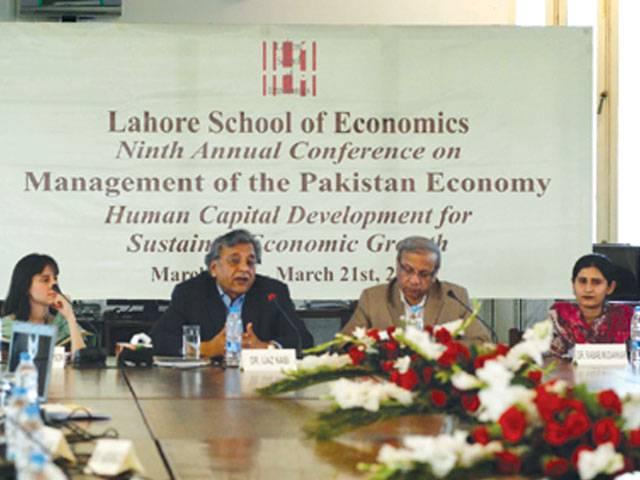LAHORE - The second day of the Conference opened with a session on the role of institutions in Social Service Delivery. The first paper in this session by Dr. Azam Chaudhry (Associate Professor and Dean of Economics Department at Lahore School of Economics) and Kate Vyborny (DPHIL candidate at University of Oxford) focused on how patron-client relationships in rural Punjab affect which households get access to state-provided goods and services. The study concluded that vulnerable households, such as landless and female headed households, appear less likely to receive assistance from patrons, suggesting that patronage activity could increase inequality of outcomes. The second paper in this session by Dr Ali Cheema (from Centre for Economic Research in Pakistan) looked at the impact of history on long term educational attainment in Punjab, Pakistan. His findings showed that differences in class status institutionalised at the time of colonial village settlement lead to a sustained divergence in the rate of intergenerational educational mobility, with limited mobility for non-proprietary and marginalised groups compared to proprietary groups.
The final session of the day titled “Vulnerability, Social Safety Nets and Human Development” started with Dr. Ijaz Nabi’s (Director, International Growth Centre) paper on two currently ongoing social protection programs i.e. the BISP and the skills development programme. The paper discussed the structure of the two programmes, their success at reaching the poor and the monitoring challenges to assess their overall effectiveness. This was followed by Dr Rabab Mudakkar (Assistant Professor, Lahore School of Economics) paper on Social protection and Economic Vulnerability. The paper was unique as it focused on a development dimension which has not received much attention in the past i.e. the extent to which poor households face income and wealth uncertainties. The authors incorporate this dimension through the Uncertainty Adjusted Human Development Index. The final paper in this session by Dr Theresa Thompson, (Associate Professor, Lahore School of Economics) looked at the problems and prospects of offering micro-insurance.
The paper concludes that in the short to medium term, micro-insurance outreach could be extended through offering health insurance coverage to the entire household of microcredit borrowers, and by offering micro-insurance to all members of the rural support programmes.
, rather than only its borrowers and spouses.
Moreover, partnering with mobile phone operators for payments could reduce the transaction costs. Provinces could use the existing database of households and poverty scorecards executed by BISP to target subsidised micro-insurance policies to poor households above the BISP threshold.
The second session of day two focused on health service delivery. The first paper in this session was presented by Ms Uzma Afzal, (Senior Research and Teaching Fellow at Lahore School of Economics). Her study provided an excellent overview of current health policies and programmes which are ongoing in the country. Dr Ali Hasanain (from Lahore University of Management Sciences), presented a study on the use of information communication technology (ICT) to improve health worker performance in Punjab, Pakistan. In addition to the quantitative analysis, the paper also provided detailed qualitative account of officials’ responses to the question of how services might be improved. The final paper in this session was presented by Dr. Hadia Majid (also from Lahore University of Management Sciences). The paper explored the impact of increasing openness and connectivity of rural areas in Pakistan to the outside world on health outcomes and awareness levels. The main finding of the paper suggests that improved access to markets for rural areas through a widening and up-gradation of the road network has had a positive impact on child nutritional status as measured by height-for-age and incidence of illness.
Friday, April 19, 2024
Experts present papers at moot on Pakistan economy

893,000 students appear in SSC exams in KP
April 19, 2024
Saudi govt shows interest to fund two road projects
April 19, 2024
Moot notes diabetes, blood pressure on the rise among youth
April 19, 2024
Fire erupts in house, no casualties reported
April 19, 2024
Minister chairs meeting on modern farming
April 19, 2024
Hepatitis Challenge
April 18, 2024
IMF Predictions
April 18, 2024
Wheat War
April 18, 2024
Rail Revival
April 17, 2024
Addressing Climate Change
April 17, 2024
Justice denied
April 18, 2024
AI dilemmas unveiled
April 18, 2024
Tax tangle
April 18, 2024
Workforce inequality
April 17, 2024
New partnerships
April 17, 2024
ePaper - Nawaiwaqt
Advertisement
Nawaiwaqt Group | Copyright © 2024





